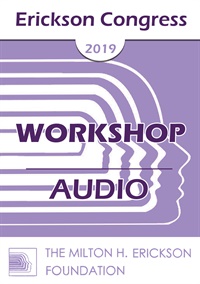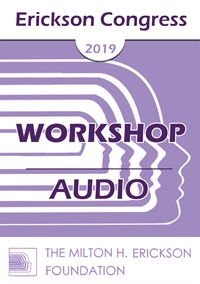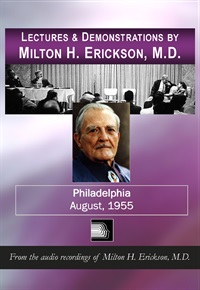
- Average Rating:
- Not yet rated
- Topic Areas:
- Workshops | Neuroscience | Unconscious Processes | Consciousness | Mindfulness | Trance
- Categories:
- Erickson Congress | Erickson Congress 2019
- Faculty:
- Richard Landis, PhD | Gary Ruelas, DO, PhD
- Duration:
- 1 Hour 58 Minutes
- Format:
- Audio Only
- Original Program Date:
- Dec 15, 2019
- Short Description:
- Whether it is a deep state of trance, a phenomenon of awe-ness, a psychedelic induced expansion, and/or a break through or breakdown of perception, therein lays a greater and “deeper” experience of change. From a neuroplastic or biological state there is the activation of the midbrain, such as the amygdale, cingulate gyrus, nucleus accumbens, which then alter the perceptions of the neocortex.
- Price:
- $15.00 - Base Price

- Average Rating:
- Not yet rated
- Topic Areas:
- Workshops | Ericksonian Psychotherapy | Psychotherapy | Ericksonian Hypnosis and Therapy Techniques | Unconscious Processes
- Categories:
- Erickson Congress | Erickson Congress 2019
- Faculty:
- Teresa Robles, MA, PhD
- Duration:
- 1 Hour 30 Minutes
- Format:
- Audio Only
- Original Program Date:
- Dec 15, 2019
- Short Description:
- Dr. Erickson proposed that all our life experiences were learnings and resources registered in our Unconscious Mind. He considered Unconscious Mind as a Wise Part. For Quantum Physics in the same way that all the information about each person is in its DNA, the information of the Whole Universe is present in each one of its parts. I call that information our Universal Wisdom. Wisdom, because it is all the information and Universal because it is the same everywhere. For me Universal Wisdom is the Creative Force, and so, Almighty. That is not a question of beliefs but a question of imagining. What we imagine for our brain is stronger than what it recognizes as reality.
- Price:
- $15.00 - Base Price

- Average Rating:
- Not yet rated
- Topic Areas:
- Hypnosis | Milton Erickson | Dissociation | Unconscious Processes | Ericksonian Hypnosis and Therapy Techniques
- Categories:
- Erickson Materials | Lectures & Demonstrations | Milton H. Erickson Collections
- Faculty:
- Milton H. Erickson, MD
- Duration:
- 2:17:27
- Format:
- Audio Only
- Original Program Date:
- Aug 01, 1955
- Short Description:
- In this set, Erickson communicates the timeless principles of hypnosis that he observed, discovered and utilized. He emphasizes the paramount importance of protecting the patient and establishing trust as the very foundation of the cooperative relationship characteristic of hypnosis. He stresses the importance of understanding the meaningful need of the patient and reviews, with many examples, the techniques of rehearsal, uncovering, dissociation, regression, time-distortion, revivification, visualization, orientation to the past and to the future, trusting the unconscious mind, and post-hypnotic suggestion.
- Price:
- $20.00 - Base Price

